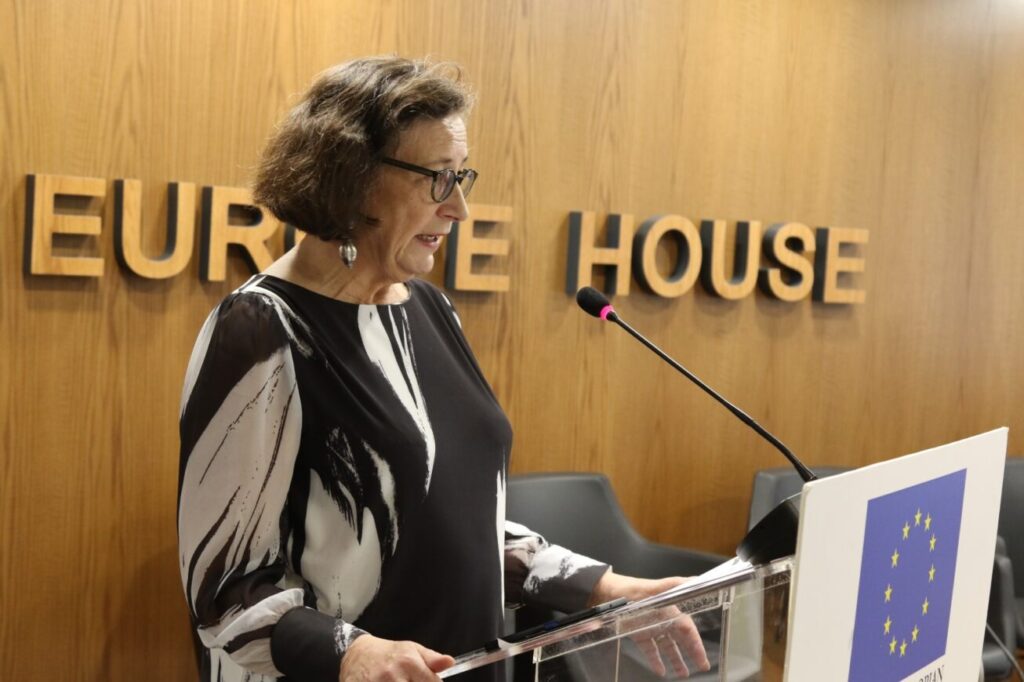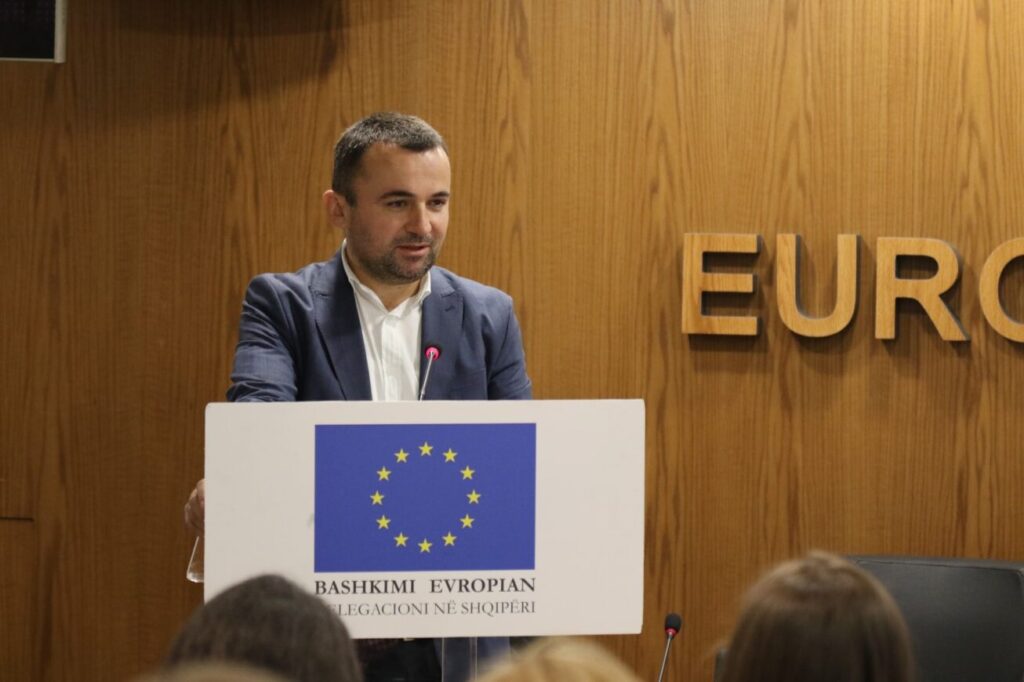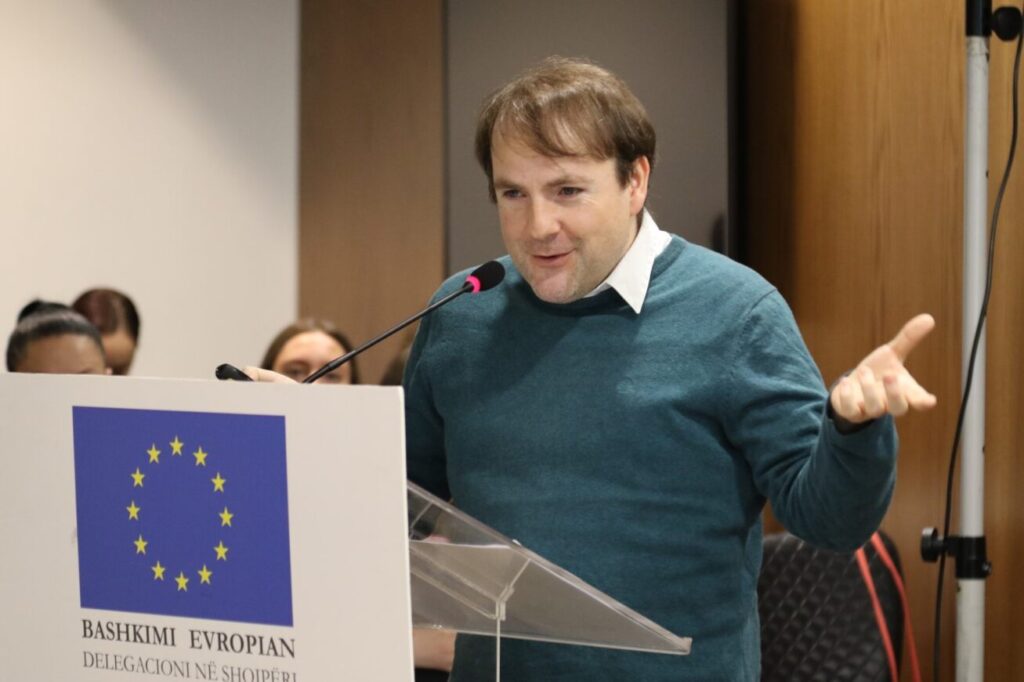Social rights in the Western Balkans – SRM23 Conference in Tirana
SOLIDAR & CLR present the Social Rights Monitor to Albanian stakeholders – the role of the EPSR in the Western Balkans
SOLIDAR’s Albanian member Center for Labour Rights (CLR) held an event in Tirana dedicated to the findings of the Social Rights Monitor 2023, our publication assessing the state of social rights, civic space and progress towards a just transition in Europe. The Conference took place in the Europe House in the Albanian capital and was moderated by Gertjana Hasalla, from CLR. It was attended by representatives from civil society organisations (including SOLIDAR’s members), of trade unions and of national and EU institutions.
The conference was opened by welcoming remarks by four speakers.
Susanne Drake, Member of SOLIDAR Board and Director of Willi Eichler Akademie, highlighted the importance of publications like the Social Rights Monitor (SRM) in identifying common social challenges in Europe and pushing for solutions. She stressed the crucial role the Western Balkans region plays in advancing social justice in Europe.
Edison Hoxha, Director of the Center for Labour Rights, welcomed all the participants and introduced the event as an open conversation on the state of social rights in the country with relevant stakeholders. He reiterated the pivotal added value of civil dialogue for the health of democracy and policymaking.


Andrea Ferrero, Head of Sustainable Economic and Social Development Section in the EU Delegation to Albania, mentioned the urgency of involving the Western Balkans into the implementation of the European Pillar of Social Rights (EPSR). He added that the economic growth of Albania should never be at the expenses of the environment, social rights and inclusion, this is why the EPSR should guide the process of integration and sustainable development. He identified youth unemployment as one of the main issues that is jeopardizing Albania’s economic and social advancement and stated that Albania should strengthen the skills of the young people to tackle this.
Reme Lala, General Director of State Social Services, focused her intervention on the need to work on guaranteeing access to social rights to the most marginalised in society and explained that the institution she leads is implementing several initiatives that go in this direction. She concluded that the SMR will help identify the areas in which more work is needed to increase social inclusion.

Following the introductory session, Carlos Roldán Mejías, Social Policy Coordinator at SOLIDAR, explained the Social Rights Monitor methodology and objectives. He underlined that the publication contained in the interactive web map reflects the assessment of civil society organisations working on social rights at national level. He also mentioned the importance of the EPSR to advance social justice and the need for it to be implemented in practice in member states, as well as in candidate countries.
At this point, Klajdi Logu, Member of CLR Board, presented the results of the SRM for Albania which CLR contributed to. He started by stating that rights are at the foundation of democracy, and therefore social rights are essential for Albania to make progress also in the field of democracy. He summarised the key points of the report, including:
- Gender equality: progress has been made but harassment of women in the workplace is still normalised. Despite the participation of women in politics and in the labour market has increased, a patriarchal mentality is still very rooted in the national culture.
- Youth unemployment: figures have slightly improved, but the lack of perspective for the future of young people keeps contributing to the brain drain. The mismatch between skills and the labour market demand is among the causes of this situation.
- Education, training and lifelong learning: a need for education on social and political rights in society at large is identified.
- Working conditions: unpaid overtime is a problem partially due to the incidence of informal economy, but minimum wages have increased by 30%.
- Civic space: Several cases of harassment and threats towards journalists have been recorded, putting freedom of expression under pressure. Civic space is becoming more and more lively in the country.
After that, a panel discussion on civil society’s role in monitoring social rights in the European Integration of the Western Balkans took place. Martina Corti, Social Affairs Officer at SOLIDAR, intervened on the crucial role that CSOs for social rights. After summarizing the common trends that emerged in the Western Balkans, she insisted on the need for a structural mechanism that ensures continuous and meaningful civil dialogue for enhancing the health of democracy and the quality of policymaking. She stressed that political will is essential to ensure this, but that CSOs can work on finetuning their messages and joining forces through European networks such as SOLIDAR to increase their impact. This is why a Task Force on the Western Balkas has been created among SOLIDAR’s members, to join forces and amplify their impact. Ada Bega, Specialist near the Directorate of Employment and Vocational Training Policies, Ministry of Economy of Albania recognised that steps forward still need to be made in Albania for the promotion of social rights and to tackle the issues emerged from the SRM, highlighting the importance of carrying out monitoring exercises of this sort. She also mentioned the essential work done by CSOs to push institutions to do more and underlined the importance of raising awareness in society and within institutions on the role of social rights and justice.

Milena Sosic, Legal Advisor at Initiative for Development and Cooperation, presented the findings of the SRM 2023 for Serbia. She noticed that with the approval of the Western Balkans Growth Pact by the European Parliament, the momentum for advancing social justice in the region and progress towards EU membership is precious. As key challenges for Serbia she mentioned the digitalisation of the provision of social services, that could reiterate and aggravate existing inequalities, the threats to democracy and civic space, gender-based violence that leads to a high number of femicides and the struggles of migrants, refugees and asylum seekers to access their fundamental rights. Sreten Koceski, Director of Community Development Institute, summarised the situation of social rights and democracy in North Macedonia. He pointed out that for CSOs to successfully being involved in civil dialogue more funding must be made available. He reiterated that joining networks like SOLIDAR and working with other national CSOs can help to strengthen the capacity of CSOs to work on advocacy, especially in an area like Western Balkans for which the EU is adopting a regional approach. He mentioned brain drain as an urgent issue in the country and called for a more and more ambitious implementation of the Youth Guarantee to tackle this emergency. Freedom of expression was also identified as an area of concern and needed action.
The panel was followed by an interactive and lively Q&A with the audience which touched upon themes like the emergency brought by the brain drain and the need to improve the living and working conditions in the Western Balkans to contrast it. The audience also raised the point that the civil dialogue in the region is still lagging behind and that more efforts must be made from the side of national institutions to meaningfully involve CSOs in decision making. Linked to this point, the need for transparent, up-to-date and accessible data was underscored.
SOLIDAR and its members will continue working together to promote social justice in the Western Balkans in the path towards EU enlargement. Stay tuned for next steps in this direction and the findings of our SRM 2024!
This conference was organized in the framework of SOLIDAR’s Organisational Strategy 2021-2025 and the program ”Realising Social Europe for All and With All”, supported by the European Union, through the EaSI strand of the ESF+ programme.


